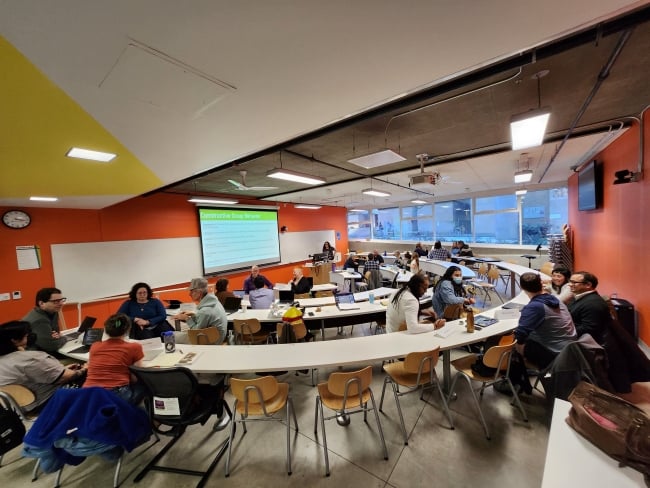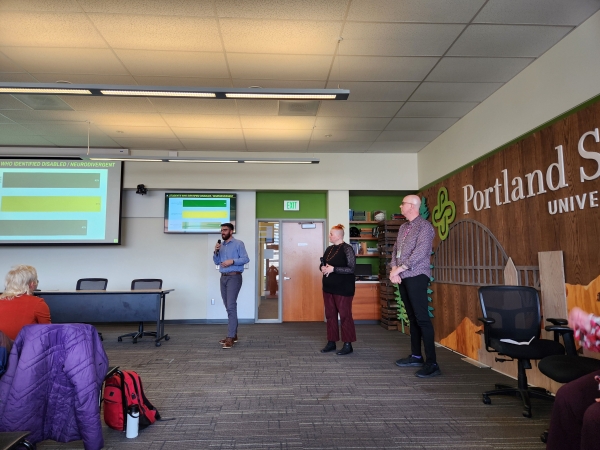You have /5 articles left.
Sign up for a free account or log in.

Over the winter 2024 term, 19 faculty, staff and administrators participated in Portland State’s inaugural Student Success Data Champions Program, meeting four times as a collective and additional times in smaller research groups.
Portland State University
Colleges and universities are wellsprings of data, both inside the classroom and outside, but not every campus stakeholder has the skills and knowledge to access and understand the available data.
Faculty, staff and administrators at Portland State University in Oregon can learn how to harness data and engage in evidence-based decision-making by participating in a new campuswide initiative, the Student Success Data Champions Program.
The short-term program helps employees understand available data, its limitations and their responsibility in reporting student outcomes to help them be better informed in their ideas and work.
What’s the need: While Portland State has experts in data sourcing and analysis, others across campus are not yet equipped with the tools and wherewithal to use institutional data, despite the importance of data in student success work, explains Erica Wagner, vice provost of student success. “Student success is often seen as the responsibility of all campus employees. However, we frequently rely on anecdotes from a small number of students about their experiences.”
As an Asian American Native American Pacific Islander–serving institution (AANAPISI) and Hispanic-serving institution, Portland State is also dedicated to equity in its work, which comes from disaggregating data and understanding how different identities participate in institutional systems.
How it works: An invitation was sent to all faculty, staff and administrators in fall 2023, and the program launched with a one-hour kickoff in December. From 70 applications, 20 individuals were selected and 19 participated.
“The selection process included representation from across campus (position type, cross-organizational units, vertical depth, minoritized backgrounds of all kinds, etc.), applicability to their work, demonstration of curiosity regarding student success and what they hoped to get out of the program,” Wagner says.
Stakeholders attended four two-hour, in-person workshop sessions from January to March, delivered by staff members from the office of assessment and research, institutional research and planning, and the office of student success. Program leads developed content with a focus on equitable data use, Wagner says.
Each session exposed attendees to existing campus data and resources that all faculty and staff can use, including institutional data sets maintained by institutional research and business intelligence solutions offices or completed student surveys.
“We did this to ensure that we were modeling a process that the participants could use once they went back to their regular offices and their day jobs, where they would not have the same kind of immediate support they enjoyed during the program,” Wagner says. “We also knew that relying on existing data would mean the institutional burden of supporting the program would be lower.”
Participants learned to utilize Excel, Tableau and Portland State’s internal reporting tool, Cognos, and how to connect data sources together.
During the term, participants were encouraged to read the book From Equity Talk to Equity Walk: Expanding Practitioner Knowledge for Racial Justice in Higher Education, which was provided to each person and referenced during workshop sessions.
Embedded in the program were five coaches—data professionals who work across campus. These coaches helped refine participants’ technical skills such as pivot tables, merging data and other Excel functionalities, as well as how and where to access data.
The Big Questions
The five research questions addressed in the inaugural cohort were:
- What is the difference in success rates between students using and not using the campus recreation center? What are the differences based on frequency of use or student demographics?
- What are the one-year persistence rates for first-year students in university studies freshman inquiry courses considering home language other than English as compared to a control group, disaggregated by race, ethnicity and first-generation status?
- What does an analysis of retention, persistence and graduation rates across colleges reveal?
- Is there a correlation between demographic representation within schools/colleges and Latiné students’ sense of belonging?
- What factors influence the sense of belonging for students who identified emotional/mental health factors and disabled/neurodivergent students at PSU?
Participants also contributed to a larger research project, working across departments and divisions in the university to utilize existing data to understand student success at Portland State. The cohort was divided into five smaller groups, each supported by a coach, and the research groups met over the three months of the program.
At the end of the program, research groups presented their findings in a 90-minute wrap-up session, which was open to campus stakeholders to ask questions and engage.
The impact: Postsurveys showed participants had a better understanding of and confidence in using student data for decision-making and were applying skills to their jobs or sharing their new skills with colleagues. A month after the program ended, one individual created a presentation for their coworkers to highlight the tools they learned. Another participant now encourages colleagues to explore existing data rather than creating a new survey to send to students.
Wagner and her team plan to continue the program in the upcoming academic year and are investigating licensing the program so other institutions could duplicate it.

The Student Success Data Champions Program grouped participants together to research an equity-focused question at the institution.
Portland State University
DIY: For another institution looking to model the initiative, Wagner offers four pieces of advice.
- Focus on winter term. Applications for the program opened in the fall, and a kickoff event introduced program members to each other prior to the start of the winter term. All programming took place during the winter term, and final presentations took place the first week of spring, which accommodated the various schedules of stakeholders.
- Create a budget. For 20 participants and five coaches, Wagner recommends a budget of $40,000 to $60,000 to provide stipends for those involved as well as other incentives such as catering, event space and equipment, to make the experience worthwhile.
- Building community. Even after the program ended, participants indicated they wanted to continue to meet periodically to learn about new data sources, hone skills and support one another in addressing student success concerns.
- Work across campus. In the selection process, program leads were intentional about getting a mix of different roles and responsibilities present, which opened up cross-campus dialogue and helped individuals expand their network within the institution.
Seeking stories from campus leaders, faculty members and staff for our Student Success focus. Share here.




